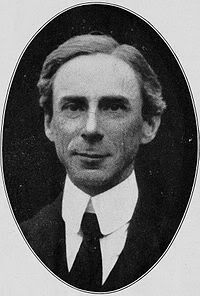I. The Young Russell
A dislike of Bertrand Russell must be an onerous burden to bear, be the focus on his work, his personality, or even his reputation. Born to British nobility positively knee-deep in precocity, Russell’s life story is strewn with achievements both bright and bold. Not a moment of his long life was wasted: in his ninety-seven years he wrote over seventy books, hundreds of essays and several thousands of letters. In the way of the Renaissance figures before him, Russell was hardly provincial in his talents: as well an acclaimed philosopher, historian, and hardboiled political figure, he was in some ways a beacon (or perhaps an epitaph) to a breed of academic that was by the twentieth century fading into obsolescence; and for these reasons he is regarded as one of the most important Western philosophers since Immanuel Kant.[1]
Russell springs to mind hunched over a cluttered bureau, suckling the temples of his spectacles in deep coitus with a battered tome, caring not for what might lie beyond its pages. This image is not, however, entirely accurate; he was not so musty and desolate in the way of his pigeonhole. He is remembered grandly as a philosopher, a mathematician, a revolutionary—but by no means least as a philanderer. The list of women he bedded is extensive, and indeed the relationships he had with them controversial. But of what possible relevance could Russell’s private life have to those whose attention is drawn to his academic work? Rather a lot, I believe. We trust our scholastic paragons to hold dear to them their works, and accordingly they often do. This internal truss often results in their scholarship being incubated in suffocating adjacency to their romantic life, breeding strange similarities between the two. In interest of these similarities this series of papers will take a look into Russell’s romantic life, and posit his issues with commitment to be not only analogous with his vagabond-like attitude within academia, but also representative of a degenerate personal philosophy. In what follows I will argue this personal philosophy to be the cause of Russell’s feelings of absence within the world he spent his life working to understand.
Russell’s Autobiography describes how he first began to question religion at the age of fifteen, something to which he had been heavily exposed since moving to live with his grandmother. By eighteen he had come to flout the existence of God entirely, along with the very concepts of free will and an afterlife.[2] He was, in modern terms, what one would describe as a fully-fledged atheist, embracing a sceptical mode of thought redolent of his late parentage. For these reasons one may find it curious that, at age twenty-two, he agreed to marry Alys Pearsall Smith, the high-minded American Quaker with a ravenous lust for tradition and conformity. The daughter of two strictly religious parents, Alys lived a life such that any transgression of her family’s wishes may have left her an anathema among her community. Indeed her older sister, Mary, led just such a ‘flamboyant’ lifestyle, marooning her husband for a famous historian and immersing herself in a life of ‘indulgence’ and ‘defiant behaviour.’[3] She seemed determined not to be led astray in the way of her sister: she stipulated a purely religious ceremony, to be conducted by the unwavering baton of tradition. Though acquiescence to such demands would not seem particularly unusual in your average nineteenth-century groom, Russell’s deference comes as a surprise considering his radical conceptions of faith and religion. He had known Alys from the age of seventeen, having spent much time travelling the continent with her family,[4] which may have provided them good time to consolidate some of their biblical differences, but this scarcely explains Russell’s inane adherence to her demands despite their conflict with his own values.[5] The relationship nevertheless spanned six soporific years, a period in which Russell appeared to achieve very little considering the tremendous success of both the years prior and subsequent. It was by the whims of an exultant bicycle ride that the marriage was brought to ruin: Russell, having come to the realisation that he no longer loved his wife, quite frankly announced his reformed affections and instigated a period of separation that bridged two decades. From what can be seen this was the beginning of Russell’s destructive appetite for self-alienation. In assuming an identity clearly incongruent with his own he had found himself in an environment that could not sustain him (wedlock with a woman who neither understood his work nor cared for it). His self-extrication was inevitable. He left unburdened with anything by the way of a guilty conscience, while, true to her Victorian ways, Alys remained silently devoted to her husband.[6]
|
Previous |
[1] Berumen, M.E.. (2009). Bertrand Russell: A Man in Full in Brief. Available: meberumen.blogspot.co.uk/2004/05/bertrand-russell-man-in-full-in-brief.html. Last accessed 31/01/14.
[2] Russell, B. (2009). Autobiography. London: Routledge. 35-6.
[3] Turcon, S.. (1983). A Quaker wedding: the marriage of Bertrand Russell and Alys Pearsall Smith. Russell: the Journal of Bertrand Russell Studies. 3 (2), 104.
[4] Barrette, P.. (1997). The Bertrand Russell Gallery, Family. Available: www.humanities.mcmaster.ca/~bertrand/family.html. Last accessed 31/01/14.
[5] [5] See Russell’s adherence to Alys’s marital demands in Turcon, S.. (1983). A Quaker wedding: the marriage of Bertrand Russell and Alys Pearsall Smith. Russell: the Journal of Bertrand Russell Studies. 3 (2), 104-7.
[6] Stangroom, J.. (2012). More On Loving Bertrand Russell. Available: blog.talkingphilosophy.com/?p=6148. Last accessed 31/01/14.









